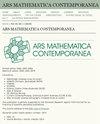广义Cayley映射及其Petrie对偶
IF 0.9
3区 数学
Q3 MATHEMATICS
引用次数: 0
摘要
Cayley映射是Cayley图在可定向曲面上的嵌入,该曲面具有一组规则作用于顶点上的保方向自同构。我们通过考虑Cayley图在可定向曲面和不可定向曲面上的嵌入,并通过要求一组规则作用于顶点上的自同构而不必完全由保持方向的自同构组成,从而推广了Cayley图的概念。这就在可定向和不可定向的情况下产生了新的地图族。由于Petrie对偶算子保留了广义Cayley映射的性质,因此本文考虑了该算子在我们的映射上的作用。本文章由计算机程序翻译,如有差异,请以英文原文为准。
Generalized Cayley maps and their Petrie duals
Cayley maps are embeddings of Cayley graphs in orientable surfaces which possess a group of orientation preserving automorphisms acting regularly on the vertices. We generalize the concept of a Cayley map by considering embeddings of Cayley graphs in both orientable and non-orientable surfaces and by requiring a group of automorphisms acting regularly on vertices that does not have to consist entirely of orientation preserving automorphisms. This leads to new families of maps in both the orientable and non-orientable cases. Since the Petrie dual operator preserves the property of being a generalized Cayley map, throughout the paper we consider the action of this operator on our maps.
求助全文
通过发布文献求助,成功后即可免费获取论文全文。
去求助
来源期刊

Ars Mathematica Contemporanea
MATHEMATICS, APPLIED-MATHEMATICS
CiteScore
1.70
自引率
0.00%
发文量
45
审稿时长
>12 weeks
期刊介绍:
Ars mathematica contemporanea will publish high-quality articles in contemporary mathematics that arise from the discrete and concrete mathematics paradigm. It will favor themes that combine at least two different fields of mathematics. In particular, we welcome papers intersecting discrete mathematics with other branches of mathematics, such as algebra, geometry, topology, theoretical computer science, and combinatorics. The name of the journal was chosen carefully. Symmetry is certainly a theme that is quite welcome to the journal, as it is through symmetry that mathematics comes closest to art.
 求助内容:
求助内容: 应助结果提醒方式:
应助结果提醒方式:


